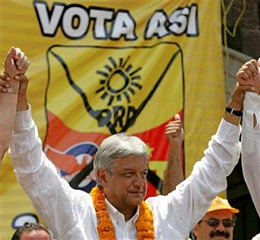 |
 |
 |
 News Around the Republic of Mexico | June 2006 News Around the Republic of Mexico | June 2006  
Nightmare Scenario Hangs Over Mexico Election
 Alistair Bell - Reuters Alistair Bell - Reuters


| | Andres Manuel Lopez Obrador, the presidential candidate for the Democratic Revolutionary Party (PRD), waves to supporters during a rally in Cuernavaca in Mexico´s state of Morelos June 25, 2006. (Daniel Aguilar/Reuters) |
Millions of angry protesters claiming vote fraud, chaos in the courts, financial markets collapsing, troops in the streets - that's the nightmare scenario should Mexico's July 2 presidential election have a disputed finish.

Although Mexico is unlikely to spin out of control, its young democracy could be tested to the limits if the vote, the first since one-party rule ended in 2000, ends in deadlock.

Leftist Andres Manuel Lopez Obrador is only inches ahead of conservative Felipe Calderon in opinion polls. To complicate matters, Roberto Madrazo of the Institutional Revolutionary Party is not far behind them in some surveys.

In the case of a close finish, losing candidates are expected to appeal based on minor irregularities and an electoral court will have to declare a definitive winner by August 31.

Electoral authorities are generally seen as independent but in a country where many believe widespread allegations that the government stole a presidential election from a leftist in 1988, things could still go wrong.

"There's a possibility that you could see a lot of people saying, 'We don't respect the new government, we're going to protest and we're going to destroy things,"' said Benito Berber an analyst at HSBC Securities in New York.

"It is really what the markets are afraid of but I assign a chance of less than 10 percent to that scenario," he said.

Former Mexico City mayor Lopez Obrador, who walked 560 miles to the capital in 1994 to protest losing a state election he says was rigged, is the man most likely to challenge the result if he loses, analysts say.

"The only candidate who could produce a focus of instability is Lopez Obrador," said political analyst Pedro de la Cruz. "He would only recognize his own triumph."

COURTS, NOT STREETS

Ricardo Monreal, a top Lopez Obrador campaign aide, told Reuters last week the leftist would not cause trouble in the streets but instead appeal to the courts if he lost and suspected irregularities.

"If there are going to be protests or whatever, a lot depends on what Andres Manuel says," leftist supporter Andres Estay, a biology student, said at a campaign rally in the city of Puebla. "People are going to be waiting."

The man refereeing the election, Luis Carlos Ugalde, is confident the politicians will act responsibly.

"I have trust in them because throughout the campaign there has been no instance of a candidate acting illegally. They can produce political rhetoric, they can accuse each other politically but they have not acted outside the law," Ugalde, head of the widely respected Federal Electoral Institute, told Reuters.

While other Latin American countries like Bolivia and Argentina have gone through turmoil in recent years, Mexico has become one of the region's most stable countries, putting behind it economic and political crises of the 1980s and '90s.

In 1988, the government infamously claimed "the (computer) system went down" just as leftist Cuauhtemoc Cardenas was headed for victory in a presidential vote. When the computers came back, government candidate Carlos Salinas was winning.

There was no large-scale violence in protests at suspected vote fraud then and even less chance of that this time.

"Fast forward 18 years to 2006 and what has changed since then is that the middle class in Mexico is more substantial and you have more people with real jobs and mortgages and all these other things," said CreditSights emerging markets analyst Christian Stracke. "There are more people who are not going to riot."

(Additional reporting by Noel Randewich in Puebla) | 
 | |
 |



